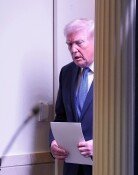President should send overture first to resolve political impasse
President should send overture first to resolve political impasse
Posted August. 28, 2013 11:51,
Domestic politics is increasingly deteriorating, as President Park Geun-hye insisted on a five-person meeting for peoples livelihoods (including the president, chairmen and floor leaders of the ruling and main opposition parties), while the opposition Democratic Party snubbed the offer.
The presidential office was yet to issue an official response to Democratic Party Chairman Kim Han-gils request to first hold a bilateral meeting followed by a multilateral meeting on Tuesday. Hence, chances are mounting that the regular session of the National Assembly in September could see crippled operation.
As President Park proposed a five-person meeting for peoples livelihoods, President Park said, The National Intelligence Services (alleged) intervention in the presidential election has nothing to do with me. Lets only talk about peoples livelihoods in expressing her distrust in parliament.
While criticizing that the opposition party is also held accountable for partisan confrontation to a large extent, political scholars pointed out that President Park should exercise wisdom to resolve political stalemate. It is very wrong for the opposition party to try to label the National Intelligence Service fiasco as election irregularities and engage in street protest as if playing professional wrestling outside the ring, said Kim Kwang-woong, an emeritus professor of Seoul National University. The president did nothing wrong with regard to the agencys intervention in the presidential election. Her election was not achieved due to such an intervention either. But the professor added, The core of democratic politics is negotiation, compromise and concession, and urged the president to send overture to the opposition party.
Kim claims that if Park fails to take such a move, damage from wasting of national energy will be fully passed on to the public and responsibility for political deadlock will inevitably be borne not only by the National Assembly engaged in political struggle but also by the president herself.
The presidential office insists that it cannot accept the Democratic Partys excessive demand for the presidents apology for the National Intelligence Agency debacle, which the president is not liable. But many experts viewed that the presidential offices recognition that the controversy over the spy agency is an issue to be addressed by the National Assembly is problematic. "Korea adopts the presidential system pursuing the separation of powers, but as the presidential office, the government and the ruling party move in tandem as a single body, the country is effectively run under a cabinet system pursuing convergence of power," said professor Kim Hyeong-joon at Myongji University. In other words, it is an incompatible thing to do for the president to insist on denial of the National Assemblys involvement in the National Intelligence Service affairs, while denying the reality that the ruling party always sides with the government and the opposition party opposes the government.
(The president) cannot resolve the impasse by displaying a stance to criticize partisan strife under a situation where dialogue with the political circle remains severed, said Choi Jin, director of the Institute of Presidential Leadership, stressing that it is also a part of the responsibilities of the president to resolve major political challenges.







